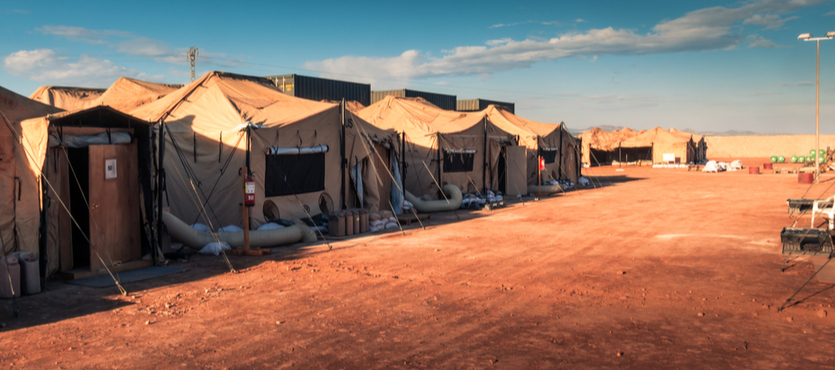An Al-Shabaab attack killed two contractors and an Army specialist and destroyed six aircraft in a daring raid on the Manda Bay Army base in Kenya.
About a dozen militants stormed the sleepy airbase, taking Americans by surprise. Most personnel huddled together in tents, anxiously waiting out the hours-long firefight. The three people killed was the largest number of fatalities in a single episode in Africa since a 2017 ambush in Niger.
The Manda Bay assault began when the militants broke through a poorly-defended perimeter fence and converged on an airstrip. As a Beechcraft twin-prop surveillance plane taxied on the runway, it was hit by a rocket propelled grenade, killing the two pilots and seriously wounding a third crewmember. The militants then destroyed several other aircraft on the ground and a fuel storage tank. Americans from nearby installations, including elements of the 101st Airborne Division, were dispatched soon after fighting began. But by the time they arrived, the Al-Shabaab fighters had withdrawn.
A few weeks later, an American airstrike killed an unnamed Al-Shabaab member, whom officials said was the mastermind of the Manda Bay strike. “This strike demonstrates that we will continue to relentlessly pursue those responsible for Manda Bay and those wishing to do harm to Americans and our African partners,” said U.S. Gen. Stephen Townsend.
The Horn of Africa: A Closer Look
For many reasons, this area has considerable strategic importance. For example, it is located on the shores of the mouth of the Red Sea. That is one of a handful of global chokepoints. According to most people, the Horn of Africa includes Ethiopia, Kenya, Djibouti, and Somalia.
This area is also inherently unstable. Religiously and culturally, it straddles the line between the mostly Muslim north of Africa and the mostly Christian south. The area is also fiercely independent. At one time or another, European countries permanently ruled all of Africa, except for Ethiopia and Liberia on the west coast. And, Liberia is essentially an American protectorate.
Because of its instability and its location, the Horn of Africa is also one of the fronts in the Global War on Terror. Al-Shabab, an ISIS-affiliated group based in Somalia, is the primary terrorist group in the area. Boko Haram, a group active mostly in northwest Africa, has a presence in the Horn as well.
Contractors in the Horn of Africa
This environment is ideal for private military contractors. Americans are reluctant to support another long-term military presence in yet another unstable MENA (Middle East and North) nation. Yet because of the aforementioned strategic importance of this region, such a presence is vital. That is especially true since Russia is making inroads in the area through Libya and the nearby Central African Republic.
Contractors provide an answer. They do not count in official DoD tallies. Unfortunately, Americans also do not feel as much sympathy for wounded or killed contractors. When the two contractors died in Kenya, there was very little reaction. However, Defense Base Act benefits are available to take care of wounded contractors and their families. More on that below.
Servicemembers and veterans are usually very popular at home, but they are not very popular abroad, at least in most cases. Yet no foreign government wants to be the next Iraq mess or the next Russian client state.
Once again, contractors might be the answer. Local politicians can truthfully announce that the American military presence is limited. Additionally, contractors know how to blend in, so in many cases, they are almost invisible.
Finally, contractors provide some services which regular servicemembers are not trained to perform and do not wish to perform. This list includes things like training local soldiers, maintaining equipment, and providing logistical support.
Injury Compensation Available
All these activities involve significant risk. Medical help is not always immediately available. In the Manda Bay attack, one wounded man waited on the field for several hours before he could be airlifted out.
Trauma injuries are not the only problem. Many contractors work in rather poor conditions. Usually, there is no such thing as OSHA or other government safety watchdogs in places like Kenya. And, if there is such an agency, these bureaucrats usually care little about American contractors.
In both these situations, the DBA provides key benefits and compensation to address economic losses, such as:
- Lost wages, and
- Medical expenses.
When contractors sustain temporary disabilities, the DBA usually pays two-thirds of the average weekly wage for the duration of tha disability. If injured contractors are able to work but must take a light-duty assignment, like a stateside desk job, the DBA usually pays two-thirds of the difference between the old and new salaries.
The Average Weekly Wage includes more than regular compensation. It also includes irregular cash compensation, like overtime and performance bonuses. The overtime is usually based on average overtime for the most recent few pay periods. Moreover, some contractors miss out on performance or signing bonuses because they are unable to work.
Moreover, AWWs are not always easy to calculate. Many contractors are hurt shortly after they arrive. So, their prior wages might not reflect their current wages. There is a big difference in salary between a security guard in Kenya and a security guard in Kentucky.
Covered medical costs usually include all reasonably necessary medical expenses. That usually means everything from the first day of emergency care to the last day of physical therapy. Generally, health insurance companies refuse to pay injury-related medical costs. That refusal could leave families holding the bag, if it were not for the Defense Base Act.
Contact Barnett, Lerner, Karsen, Frankel & Castro, P.A. to learn more about qualifying for DBA benefits.

